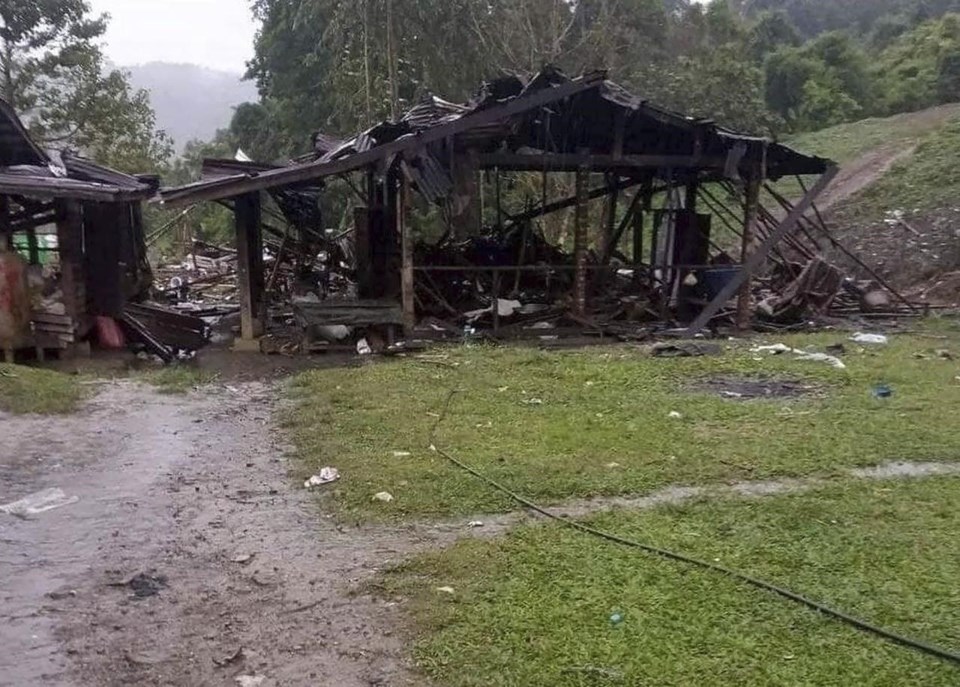BANGKOK (AP) — Southeast Asian foreign ministers will hold a special meeting Thursday to discuss ways to deal with a growing crisis in Myanmar, where a military takeover last year set off violence that threatens to destabilize the region.
Recent events in Myanmar, including a military air strike on Sunday that reportedly killed as many as 80 members of the Kachin ethnic minority, have heightened worries among the Association of Southeast Asian Nations.
ASEAN’s chair, Cambodia, issued a statement on Tuesday saying the group is “gravely concerned over the recent escalation of violence in Myanmar.”
“We urgently call on all parties concerned, in particular one with significant power on the ground, to take concrete actions to enable a process of inclusive and constructive dialogue and to seek a peaceful solution and national reconciliation in Myanmar, and for the sake of peace, security and stability in the region,” it said.
Thursday’s meeting comes ahead of ASEAN’s annual summit on Nov. 11-13, where a top focus of the leaders will be the Myanmar situation, which has threatened the group's unity. ASEAN members traditionally avoid criticizing each other, and the violence unleashed by Myanmar’s military is widely seen as exposing the group's powerlessness in dealing with a geopolitical and humanitarian emergency that could affect all of them.
The foreign ministers' meeting will be held in Jakarta, Indonesia, and be chaired by Cambodian Foreign Minister Prak Sokhonn, who is ASEAN’s special envoy for Myanmar, ministry spokesperson Chum Sounry said Wednesday.
ASEAN, which includes Myanmar, has tried to play a peacemaking role since shortly after the country's military seized power in February last year, ousting the elected government of Aung San Suu Kyi.
It has been seeking to implement a five-point consensus on Myanmar it reached in April last year, with little success. The agreement calls for the immediate cessation of violence, a dialogue among concerned parties, mediation by an ASEAN special envoy, provision of humanitarian aid and a visit to Myanmar by the special envoy to meet all concerned parties.
Myanmar’s military-installed government initially agreed to the consensus but has made little effort to implement it, aside from seeking humanitarian aid and allowing ASEAN’s special envoy to visit. But it refused to allow Prak Sokhonn to meet with Suu Kyi, who was arrested and is being tried on a variety of charges that critics say are contrived to sideline her from politics.
The military says it will not allow any outsiders to meet with Suu Kyi while her court cases continue.
In response, ASEAN has not allowed Myanmar’s leaders to participate in its official meetings, though working-level officials have joined some.
ASEAN members Malaysia, Indonesia and Singapore in particular have urged that more pressure be put on Myanmar’s military rulers to implement the consensus.
Malaysian Foreign Minister Saifuddin Abdullah has suggested that ASEAN openly and directly deal with Myanmar's National Unity Government, an opposition group that claims to be the country’s legitimate government. It is widely popular, but Myanmar's military has declared it a terrorist group.
Saifuddin is the only senior official in ASEAN who has openly held talks with the National Unity Government. He will not attend the Jakarta meeting, sending senior officials instead, because Malaysia is preparing for a Nov. 19 general election.
In an editorial Wednesday, Indonesia's Jakarta Post newspaper urged the ASEAN foreign ministers “to take bolder action against the defiant Myanmar junta by recommending that their leaders invite representatives of the government of ousted leader Aung San Suu Kyi to the ASEAN summit.”
“Excluding the Myanmar military regime from any ASEAN official meetings has proved to be ineffective in bringing changes to the country, where genocidal acts against people have persisted despite the junta leader Gen. Min Aung Hlaing’s pledge to comply with the Five-Point Consensus,” it said.
___
Associated Press writers Sopheng Cheang in Phnom Penh, Cambodia, and Eileen Ng in Kuala Lumpur, Malaysia, contributed to this report.
Grant Peck, The Associated Press




